Bulk Pricing
7 Port USB 3.2 Gen 1 Hub w/ Surge Protection
Industrial Grade | +12V DC Input | Surge Protection | Surface Mountable | 5 Gbps
- Protect Your Equipment: The 7-port USB 3.2 Gen 1 hub features 350 Watts of surge protection to keep your connected peripherals safe from harm.
- Super Fast Speeds: This USB hub is 3.2 Gen 1 compliant, ensuring super-fast 5Gbps data transfer speeds. It supports super speed, high speed and full speed which enables it to be compatible with USB 2.0 / 1.1.
- Superior Build Quality: Housed in a rugged steel chassis with built in mountable flanges, the 7-port hub is perfect for installations in offices, labs, warehouses, heavy machinery, automation equipment, and other industrial applications.
- Upstream: 1 USB port, Type B connector, Screw-lock type
- Downstream: 7 USB ports, Type A connectors
- Power Connector: DC Barrel 2.1mm ID × 5.5mm OD
- Mounting Options: Wall & Surface
- Supply Current: 900mA USB Bus Power for Each Down-stream Port
Product Documents
Product Change Notice
Quick Links:
Description
Introduction:
The CG-7U3DS is a 7-Port USB 3.2 Gen 1 Hub that complies with the Universal Serial Bus 3.2 Gen 1 (USB 3.2 Gen 1) Specifications Revision 1.0 and performs at up to 5Gbps Super-Speed. It provides 7 downstream facing ports with standard Type-A USB 3.0 connectors.
With built-in RISC-like USB 3.2 Gen 1 controller chips, it is backward compatible either when any one of the downstream port is connected to a USB 1.1 or USB 2.0 compliant device, or when the upstream port is connected to a USB 1.1 or USB 3.2 Gen 1 compliant host.
The CG-7U3DS also provides a unique feature to work in the bus-powered mode without an external AC power adapter. It’s very convenient for light power consumption USB devices to work in this mode without an extra power supply. The external DC jack is used for self-powered mode if you need more power on the 7 downstream ports. The CG-7U3DS 7-Port USB 3.2 Gen 1 Hub supports 5Gbps, 480Mbps, 12Mbps, and 1.5Mbps speeds.
Features:
- Compliant with USB 3.2 Gen 1 Specification Revision 1.0
- Windows XP, 7, 8, 10 Supported
- Built-in RISC-like USB 3.2 Gen 1 Hub Controller Chips
- Metal Case, Ideal for Critical Applications
- One Up-stream Port (Type-B) Support Super-speed, High-speed and Full-Speed
- 7 Down-stream Ports (Type-A) Support Super-Speed, High-Speed, Full-speed and Low-speed Traffic
- Supports 5Gbps (Super-speed), 480Mbps (High-Speed), 12Mbps (Full-speed) and 1.5Mbps (Low-speed) Speed
- Supports 7 Concurrent Non-periodic Transactions
- Supports Self-powered and Bus-powered Mode
- Supports 900mA USB Bus Power for Each Port
- Support USB Battery Charging: DCP mode
- Supports 7 Port 350-Watt Surge Protection
- Supports DC-Jack for +12V DC Power Input
- Optional DIN RAIL Mounting Kit
USB Device Support:
Supports keyboard, mouse, monitor, scanner, printer, PC Camera, telephone, CD-ROM drive, Pen-drives, SATA enclosures, joystick, virtual reality helmet, modem, PBX and many more.
Specifications:
- Provides 7 Downstream Facing Ports for Super-speed, High-speed, Full-speed and Low-speed traffic
- 1 Upstream Port for Super-speed, High-speed and Full-speed traffic
- Supports 5Gbps, 480Mbps, 12Mbps and 1.5Mbps speed
- Supports Self-powered and Bus-powered Mode
- Supports up to 900mA USB Bus Power for Each Down-stream Port
- Support USB Battery Charging: DCP modes
- Built-in 350-Watt Surge Protection for each port.
- Dimensions: 152.72mm(L) x 58.96mm(W) x 24.13mm(H) (length with ears 178.21mm)
- Hub Weight: .625 lbs.
Environmental Specifications:
- Operating Temperature: 0 to 55°C (32 to 131°F), 10% to 90% relative humidity (non-condensing)
- Storage Temperature: -40 to 75°C (-40 to 167°F), 5% to 95% relative humidity (non-condensing)
Product Dimensions:
- 7.0in (w/flange) 6.0 (w/o flange)(L) x 2.312in(W) x .937(H)in
Package Contents:
- 7 Port USB 3.2 Gen 1 Mountable Hub
- 6ft. USB 3.2 Gen 1 A to B device cable
- +12V/3A output AC power adapter
- User manual
*Surface Mounting screws not included.
Specifications
Product Specifications
| Power |
| ||||||||||||||||||||
|---|---|---|---|---|---|---|---|---|---|---|---|---|---|---|---|---|---|---|---|---|---|
| Compliance |
| ||||||||||||||||||||
| Physical Characteristics |
| ||||||||||||||||||||
| What's in the Box |
| ||||||||||||||||||||
| Software |
| ||||||||||||||||||||
| Environmental |
| ||||||||||||||||||||
| Product Information |
| ||||||||||||||||||||
| Hardware |
| ||||||||||||||||||||
| Performance & Safety |
| ||||||||||||||||||||
| Other Data |
|
Reviews (5)
5 reviews for 7 Port USB 3.2 Gen 1 Hub w/ Surge Protection
Add a review
Support
Product Documentation & Drivers
Product Documents
Product Change Notice
Need drawings, CAD files, or other compliance documentation? Click HERE
Relevant Articles & F.A.Q.
Relevant Articles
Product F.A.Q.
View frequently asked product questions below. Still need help? Reach out!
-
Can the hub be used without a power supply?
View AnswerIn some cases, yes. USB peripherals that only require low power (i.e. keyboards & mice) can be used without a power adapter. Power in this case is drawn from the host’s USB port.
When high-power USB peripherals are used, a power supply for the USB hub may be required. In other cases, the USB peripheral may require their own power adapters, in this case, a power supply for the hub may not be required. Without ample power though, the USB hub or connected peripherals may not operate correctly. It is recommended to use an included power supply when possible.
-
After waking up from sleep mode, my computer/host no longer recognizes my USB device.
View AnswerIf the USB device does not function properly after your computer or host has been in sleep mode, it is likely that Windows turned off the USB Root hub in order to save power.
To prevent this, follow the steps below (depending on your operating system).
Windows 10 / 8
- On your keyboard, press the Windows key + X and select Control Panel.
- Click Hardware and Sound, then click Power Options.
- Click Change plan settings for the plan you want to change.
- Click Change advanced power settings.
- Click the plus sign (+) next to “USB settings” and “USB selective suspend setting” to expand the options and change the setting to Disabled.
- Click OK to apply the setting.
Note: You may need to disconnect and re-connect your USB device after applying these settings.
Windows 7 / Vista
- Click the Start button and select Control Panel.
- Click Hardware and Sound, then click Power Options.
- Click Change plan settings for the plan you want to change.
- Click Change advanced power settings.
- Click the plus sign (+) next to “USB settings” and “USB selective suspend setting” to expand the options and change the setting to Disabled.
- Click OK to apply the setting.
Note: You may need to disconnect and re-connect your USB device after applying these settings.
Windows XP
- On your desktop, right-click the My Computer icon and select Properties.
- Click the Device Manager tab.
- Expand Universal Serial Bus controllers by clicking the arrow to the left of it.
- Right-click the first USB Root Hub device and select Properties.
- Click the Power Management tab.
- Clear the box next to Allow the computer to turn off this device to save power.
- Click OK to apply the setting.
- Repeat steps 4-7 for any remaining devices in the Universal Serial Bus Controllers section with “Root Hub” in the name.
Note: You may need to disconnect and re-connect your USB device after applying these settings.
-
The hub is properly hooked up, but is not functioning correctly. What can I do?
View AnswerTesting all setup components is the best place to begin troubleshooting. To determine the source of the issue, individually test your:
- USB Cable by using it in another setup, or trying another cable.
- Host USB Port by connecting another device or thumb drive.
- Connected Peripherals by connecting directly to the host.
Moving on to troubleshooting the hub itself. Attach a USB peripheral. The USB hub itself will not appear in hardware listings on your host’s system. USB devices connected however, will appear when connected. If the connected device is still not being found, try:
- Installing the required drivers for the USB peripheral.
- Install the most recent drivers for the USB controller and/or motherboard chipset.
USB hubs do not require drivers or software.
Troubleshooting the desired USB peripheral may be in order. If the peripheral is still not being recognized, attempt:
- Attaching external power to the peripheral, if required.
- Confirming if the peripheral functions on a standard USB port.
- Testing if basic USB peripherals work, such as keyboards or mice.
-
How can external power be connected to the industrial USB hub?
External power is supplied by connecting to the terminal block located on the hub. For when an external power adapter is required check out the Accessories & Replacement Parts section on this product page. To view all of our hub accessories and power supplies, visit the category here.
How to properly choose a power supply.To determine the power requirements, the equation to use is P = 5 * I * N, where:
P is the power wattage.
5 is the USB port voltage.
I is the current of the USB port in Amps (USB 2.0 is 0.5A, USB 3.0 is 0.9A.
N is the number of USB ports.
As an example using the equation, a 4 port hub would reflect a minimum wattage of 18 watts.
Knowing the minimum requirement, a proper power adapter can be chosen. In this case the voltage of a power supply should be within 7 to 24 or 7 to 40 Volts DC, depending on the specifications of the USB hub. Also, the power supply must convert AC to DC (no AC output).
Power supplies often come with a voltage (V) rating and an amperage (A) rating. To determine the current in amps, use I = P / V, where the following is true:
I is the current of the power supply.
P is the calculated power of the hub.
V is the chosen voltage of the power supply
Continuing the example, the 4 port hub requires 18 W and the power supply you choose is 12V, the current of the power supply would be I = 18/12, I = 1.5A.
Our full collection of power adapters can be found here.
Optional Accessories & Replacement Parts
Optional Accessories & Replacement Parts
Model# DIN-RAIL-MCLIP
$5.33In stock

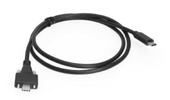
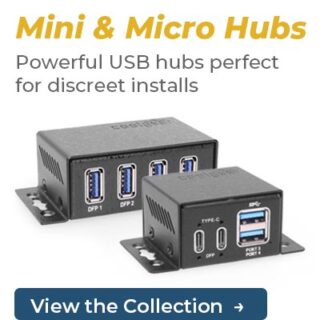
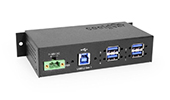
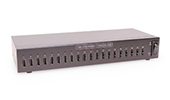
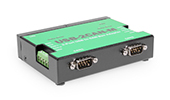
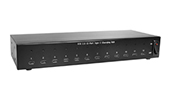
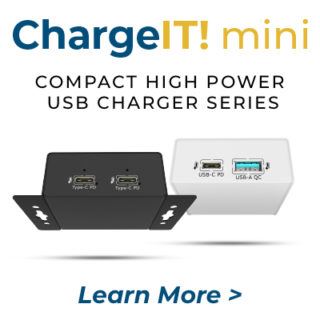
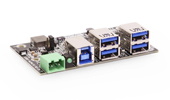
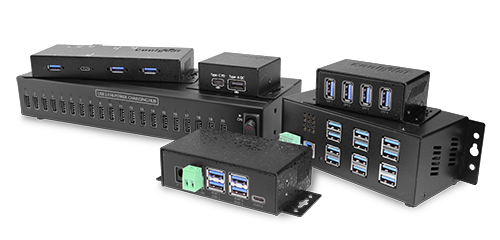
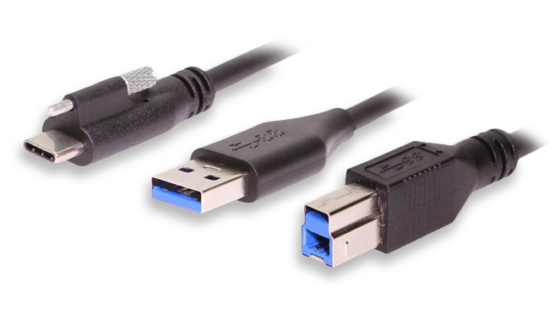
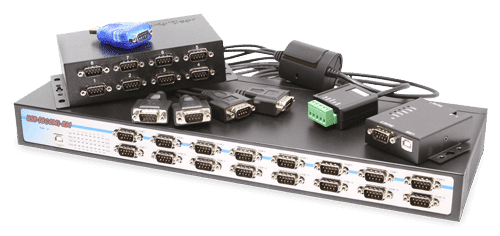
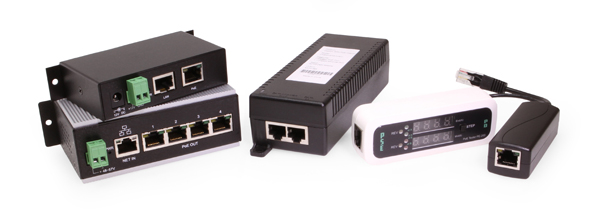
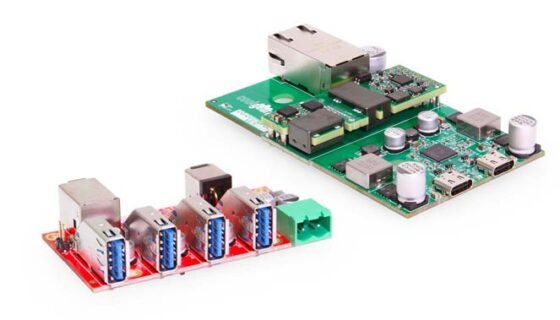

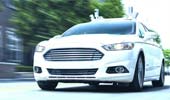



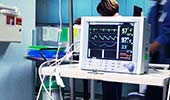

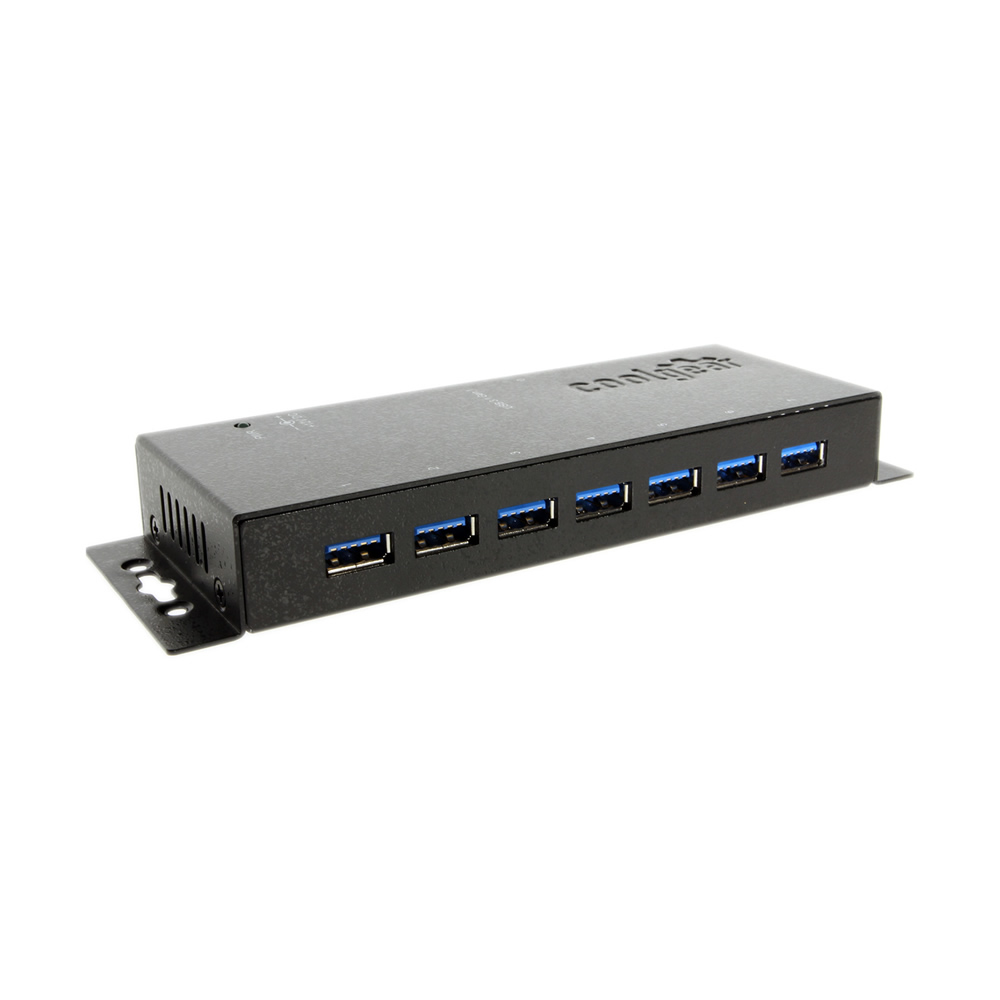
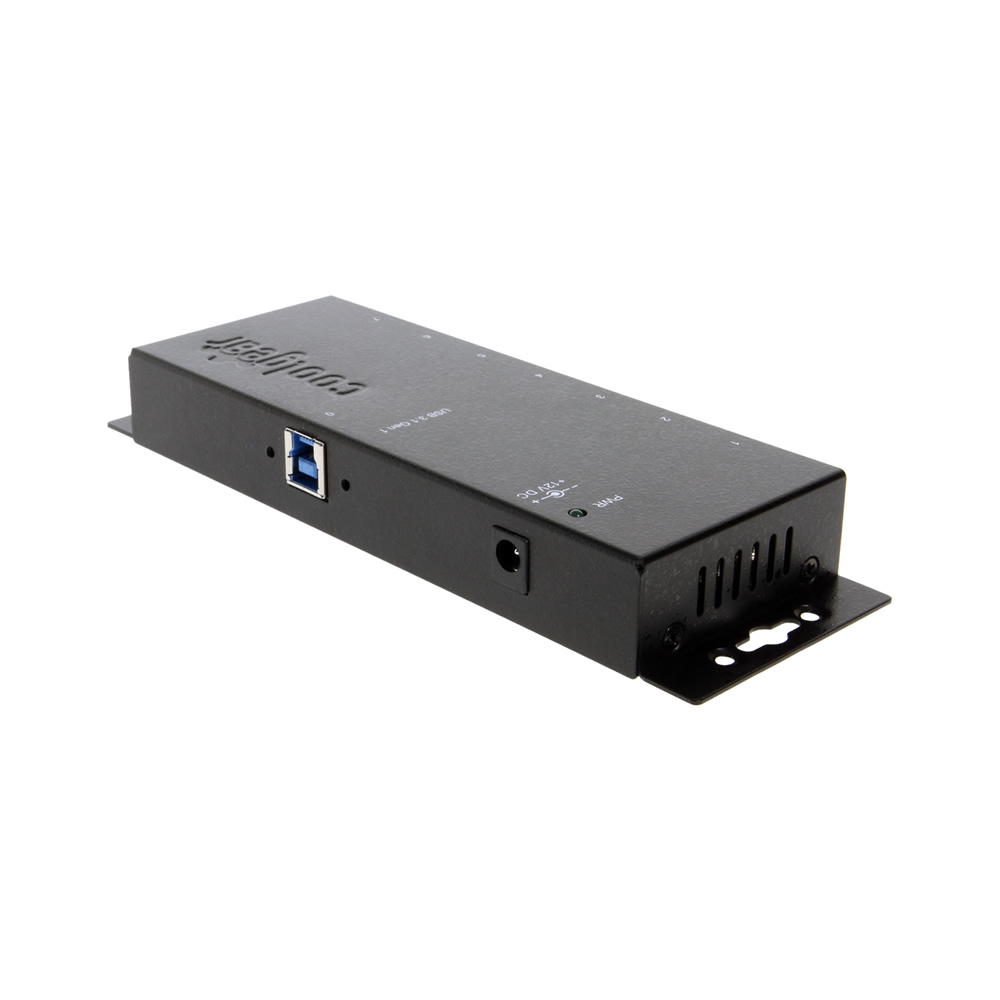
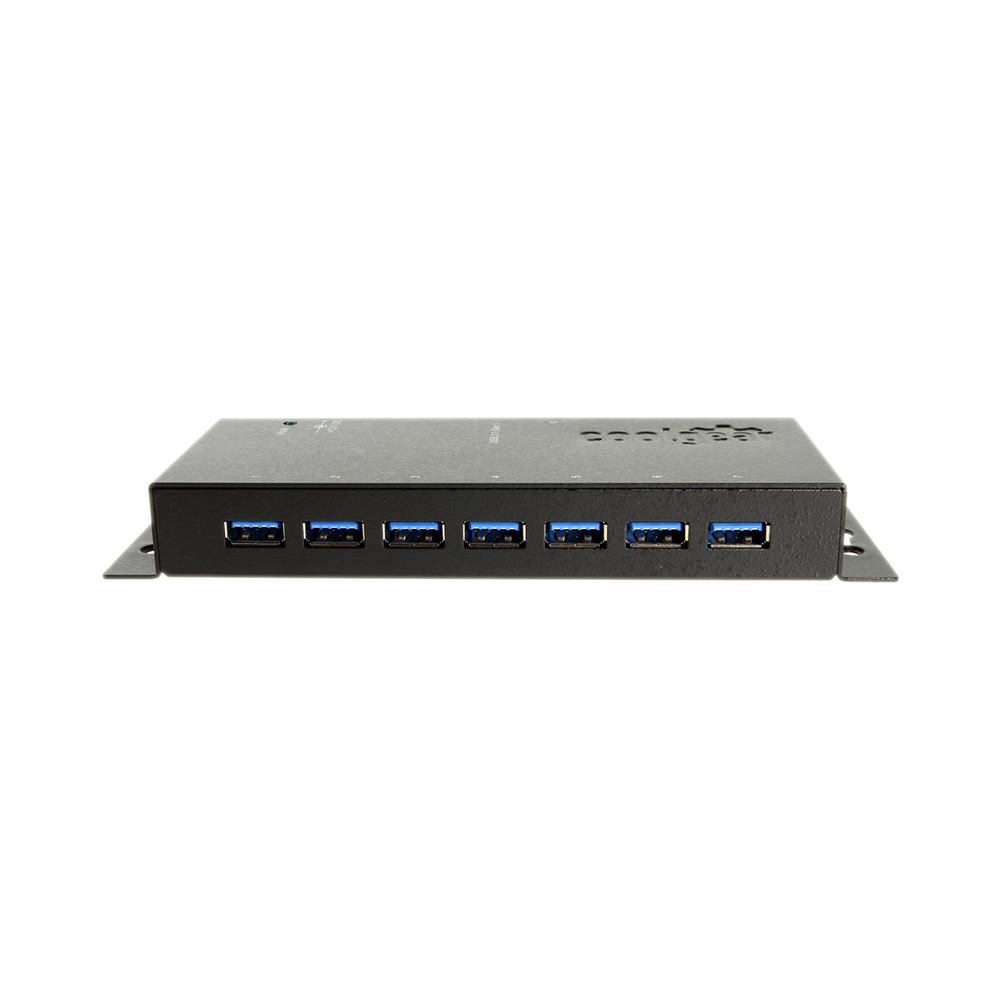
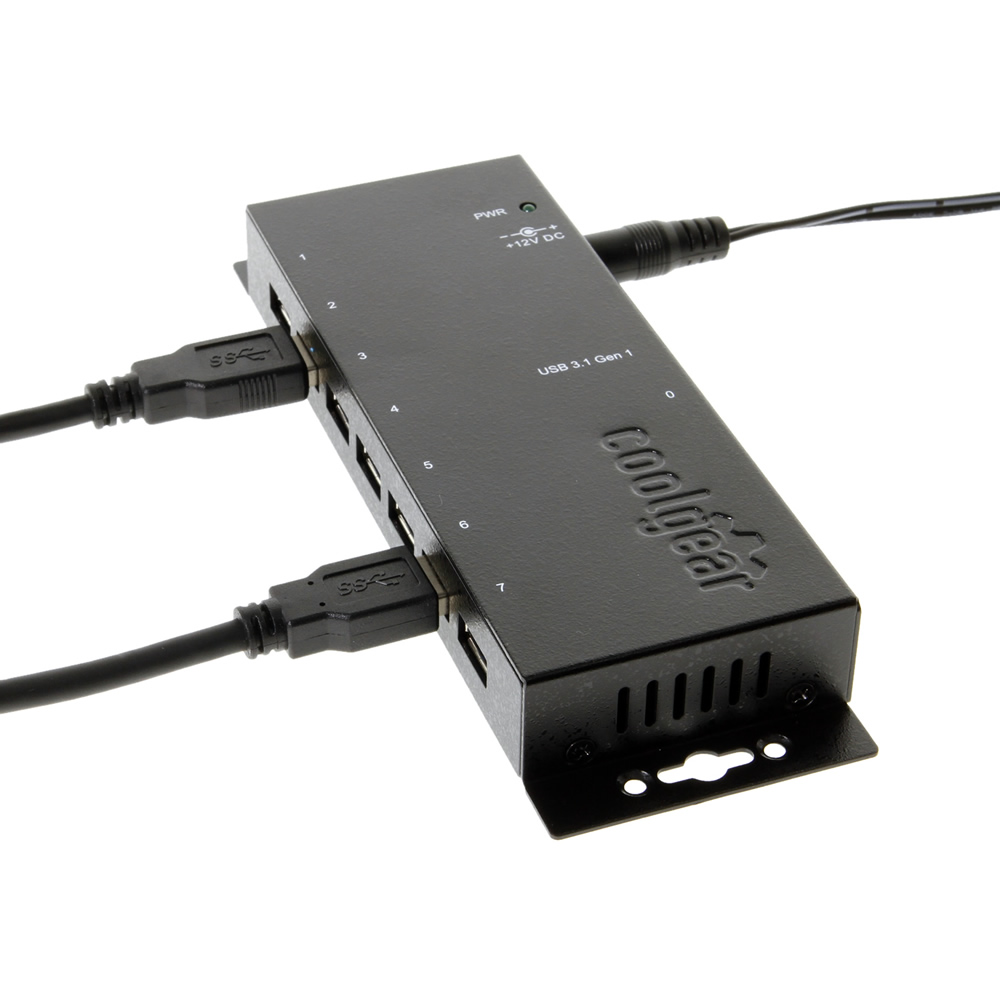
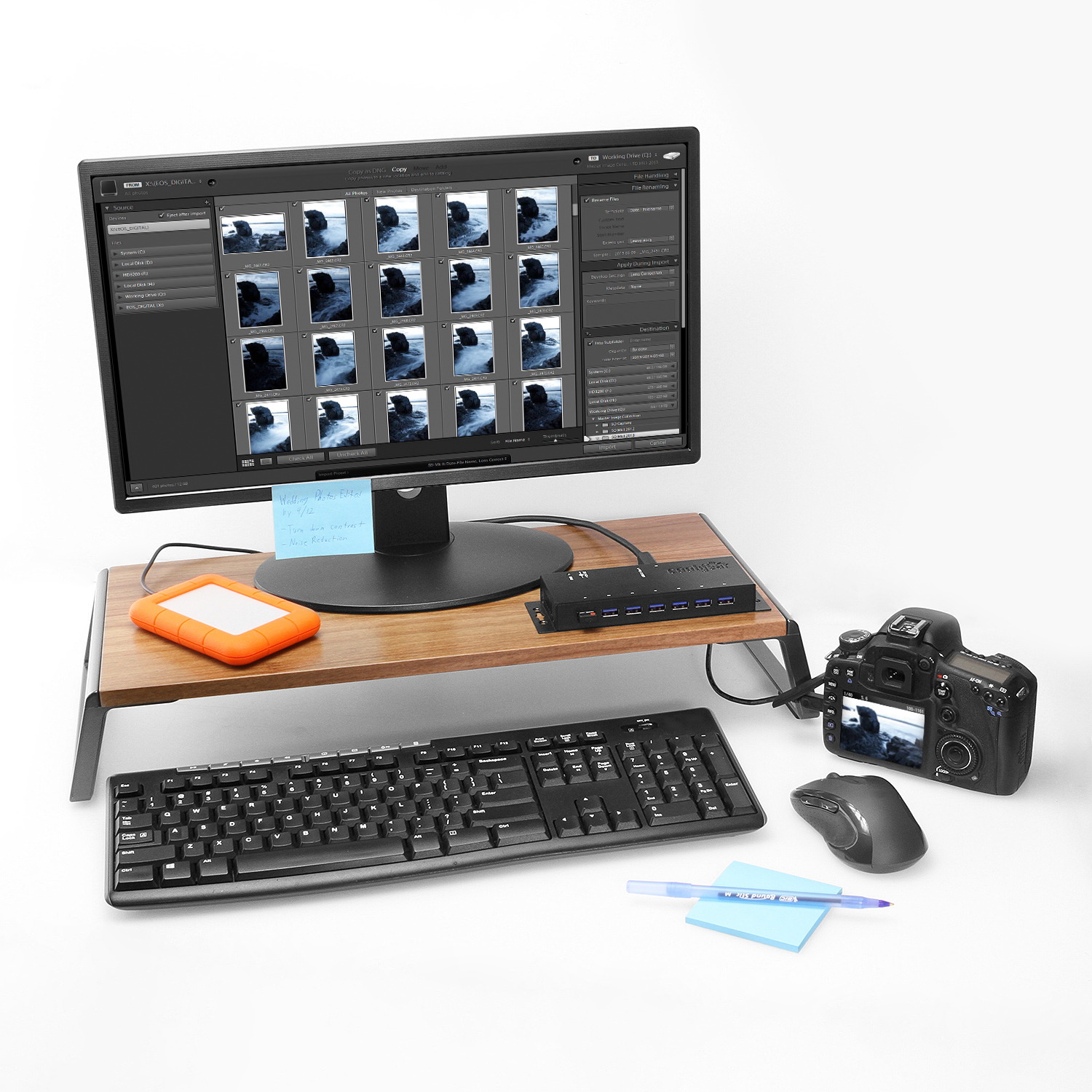
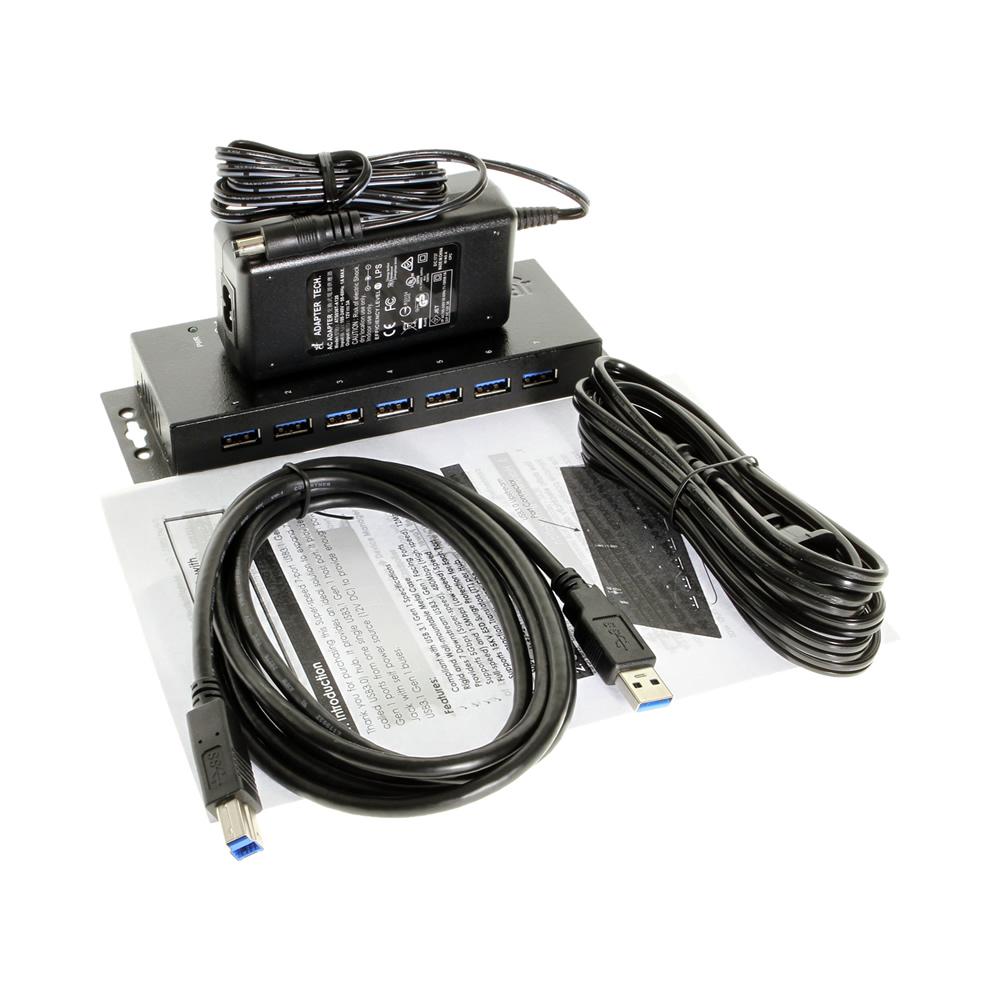
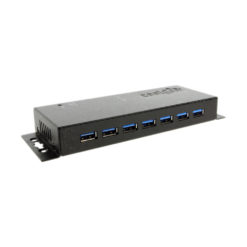
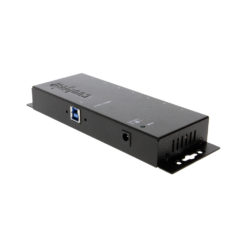
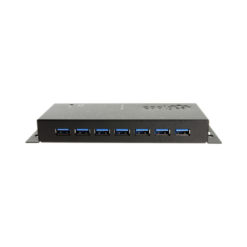
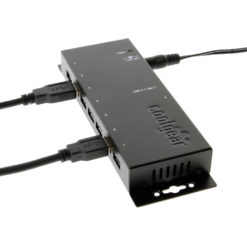
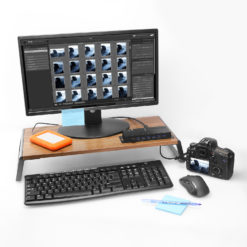
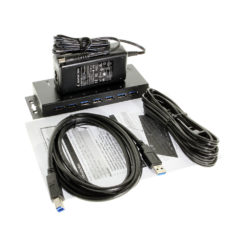




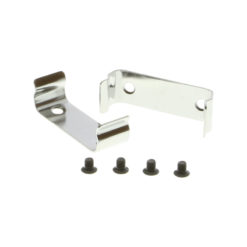
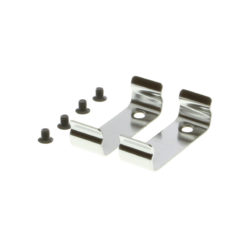
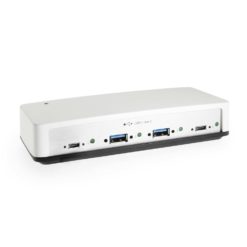
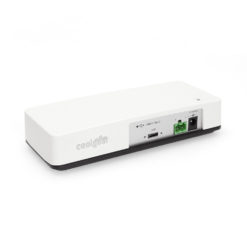
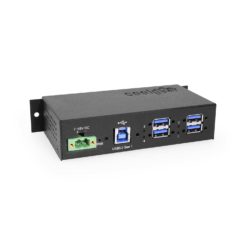
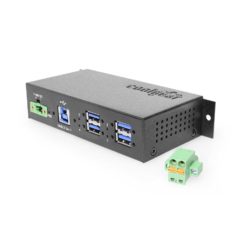
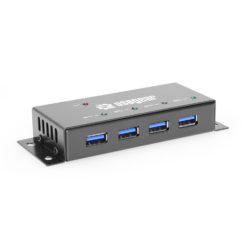
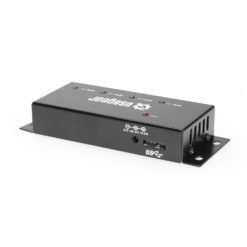
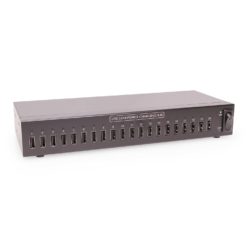
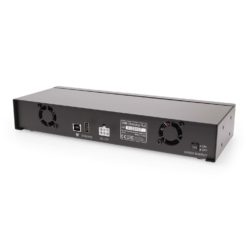
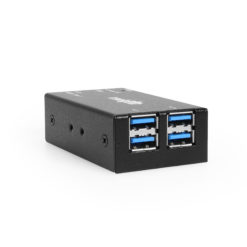
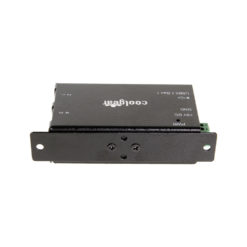
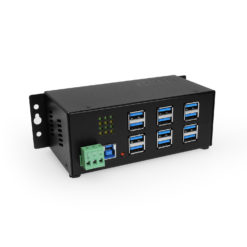
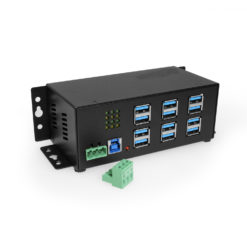
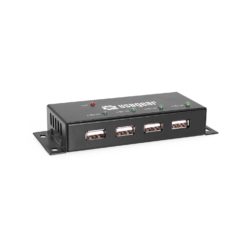
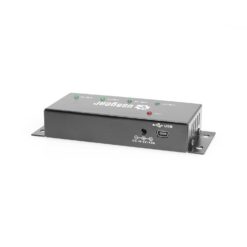
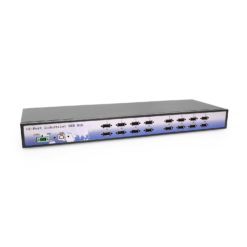
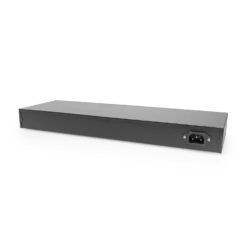
Jonathan –
Solid, powered USB 3 hub
It’s a great hub with good mounting options. Another pro: the power and to-pc USB cable are on the back, which weirdly isn’t standard on some hubs. Haven’t run speed tests but don’t really care, it’s for peripherals like mouse, headset, keyboard, etc that I didn’t have enough ports for.
Thomas L Watts III –
Not a USB 3 hub
Hub would not detect and install drivers when plugged into a USB 3 port. Worked properly when plugged into a USB 2 port. Only use for low speed devices such as keyboards, printers, etc.
Jeff A. –
Does not Work With Handful of Devices
Well, this hub is not working out well…. Corsair products (keyboard, Nexus, Elgato Stream Deck) do not work with this hub, they work fine in my el cheapo 4 port grommet hole hub but not this high quality, USB hub. Reluctant to return for refund, it works with other components. Ordered a different hub that I can mount under desk, if that one works then this one is going back.
George Beckstein –
Utilitarian, compatible, high quality USB hub
Great quality, love the utilitarian look. It integrates well into my desk as a custom installation and does not draw attention to itself — it’s a USB hub not a decoration.Easy to mount out of the way due to its low profile AND the fact that the upstream USB port and DC power port are on the back side of the hub. With other hubs you’ll always have the upstream cable sticking out the front. Not ideal for flush-mounting to the edge of your desktop.I bought the USB 3.0 version because I had the same hub with USB 2.0. The older USB 2.0 version did not work properly with my thunderbolt dock (running a Dell XPS15 9570 and Dell TB16 dock). It would crash the whole USB bus on the dock after less than a minute of being connected, even after updating all the firmwares and drivers. The TB16 just doesn’t like the USB hub chips inside the USB 2.0 version. 🤷🏼♂️The USB 3.0 version has cured this problem and given me many more built in ports on my electronics workbench! The added bandwidth of USB 3.0 is a nice plus.The price is relatively high for a USB hub, but this product makes up for it in being one of the only “low key” USB hubs available, with a metal chassis that is mountable, and it comes with a 12V/3A (36W) power supply that can provide some serious power to a number of connected USB devices. Further, most hubs will cheap out and include an unusably-short, poorly made USB cable. The cable provided with this one is sturdy, well built, and is 6ft long — long enough to run under and across my workbench to my dock from the opposite corner.Perfect. I plan to be using this hub for decades to come (or as long as USB 3.0 type A stays relevant)!
Master Mold –
Works great. not a problem with a single port. I have it on my desk for now. i got it for its mounting ability. im going to mount it under my desk. Metal all the way around. real sturdy. heavy. feels like a quality product in the hands. works for everything i need. super convenient. Only Downside is the price. took a nice chunk of change for this bad boy. Thing is i looked up every mountable 7PORT U.S.B hub. this one was the only one that fit every single one of my needs. so i have no complaints about the physical product itself. just the price. but is thee best one on amazon in my opinion. haven’t tried them all. but from what i could read n see. this one had all i wanted. all the others had something i wanted but not everything. this one had all but price. But oh well so far well worth it. ill make an update after a longer time of use.